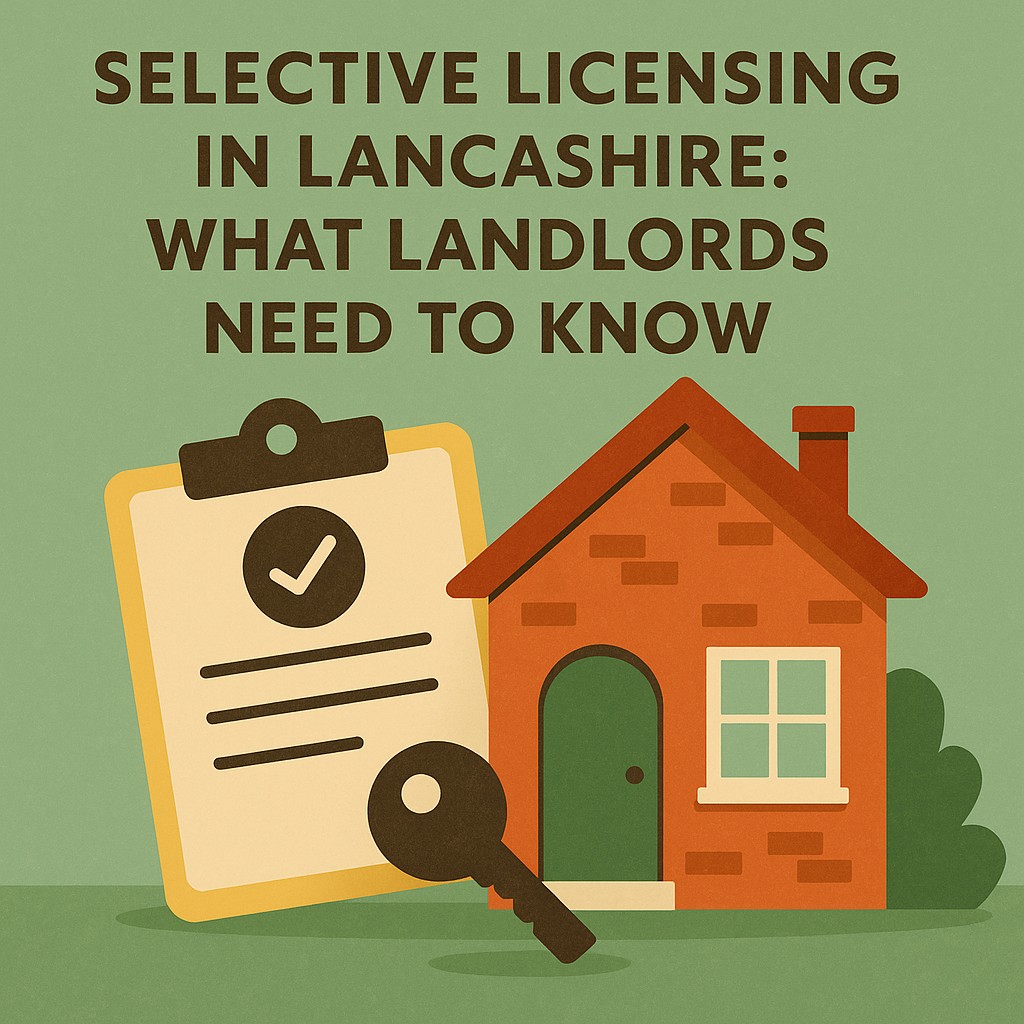The private rented sector (PRS) is a vital part of Lancashire’s housing market, providing homes for thousands of people. But in areas where poor housing conditions, anti-social behaviour, or low demand exist, councils have the power to step in with Selective Licensing schemes.
If you’re a landlord in Blackpool, Burnley, Preston Lancaster or Morecambe, here’s what you need to know about current and proposed schemes, the costs involved, and the reasons behind them.
What is Selective Licensing?
Selective Licensing is a discretionary scheme introduced under the Housing Act 2004. It allows local authorities to designate specific areas where landlords must obtain a licence for privately rented properties (unless exempt under law).
The aim is to:
- Improve housing standards.
- Ensure landlords are managing properties responsibly.
- Protect tenants from poor conditions and bad practice.
- Reduce issues such as anti-social behaviour and low demand.
Key points:
- All landlords in a designated area must apply for a licence.
- Operating without a licence is a criminal offence and can lead to prosecution, unlimited fines, or civil penalties of up to £30,000.
- Councils may issue Rent Repayment Orders or even take control of properties through Interim Management Orders.
- A landlord cannot serve a valid Section 21 notice on an unlicensed property.
Blackpool: Selective Licensing Begins April 2025
In November 2024, the Secretary of State approved Blackpool Council’s proposal for selective licensing across the town’s inner wards: Bloomfield, Brunswick, Claremont, Talbot, Tyldesley, Warbreck, Waterloo, and Victoria.
- Start date: 1 April 2025 (applications open).
- Deadline: All landlords in the area must have applied by 1 October 2025.
- Scope: Around 7,000 private rented homes.
Licence Conditions cover:
- Property management.
- Tenancy management.
- Fire and building safety.
Costs & documents required:
- Fees are self-financing – no council profit.
- Required documents include an EICR, gas safety certificate (if applicable), and EPC.
- Landlords meeting the Blackpool Standard will need to provide a tenancy pack.
👉 Check if your property is included and apply here.
Burnley: Established Licensing Zones
Burnley has operated selective licensing for several years and is expanding the scheme. It currently applies in areas such as Burnley Wood with Healey Wood, Leyland Road, Trinity, Daneshouse, Gannow, Queensgate, and Padiham.
- Duration: Each scheme lasts up to 5 years.
- Licence criteria: Applicants must pass a “Fit and Proper Person” test and meet property management standards.
Costs:
- £715 per property (Burnley Wood & Leyland Road).
- £750 per property (Trinity, Daneshouse, Gannow, Queensgate, Padiham).
- Discounts for early applications or members of the Good Landlord and Agent Scheme (GLAS).
👉 View Burnley’s selective licensing details here.
Preston: Consultation on Pilot Wards
In June 2025, Preston City Council approved a consultation to explore selective licensing in three wards: St Matthews, City Centre, and Plungington.
Why Preston is considering licensing:
- One in four homes in the city is privately rented.
- Many tenants face poor conditions, partly due to ageing housing stock and lack of investment.
- The scheme would help tackle deprivation, poor management, damp/mould, and safety concerns.
If introduced, landlords would need to:
- Pass criminal record and “fit and proper” checks.
- Provide evidence of safety compliance (gas, fire, damp-proofing).
- Adhere to management standards.
Non-compliance could result in fines and penalties.
👉 Keep an eye on Preston City Council’s updates for consultation dates and requirements.
Morecambe & Lancaster: Proposed Selective Licensing
Lancaster City Council consulted in 2023 on proposals for selective licensing in Morecambe, focusing on the Heysham North and West End wards.
The consultation also explored Additional Licensing for HMOs.
Rationale:
- Improve housing quality in deprived areas.
- Better regulate landlords and raise standards.
- Address anti-social behaviour and poor management.
If approved, landlords in designated areas would need to apply for a licence, pay fees (to be determined), and comply with strict management conditions.
👉 Read the Morecambe feasibility study.
Why Selective Licensing Matters for Landlords
While licensing means extra paperwork and costs, it also:
- Creates a level playing field where good landlords are recognised.
- Drives rogue landlords out of the market.
- Helps stabilise communities and increase demand for quality rentals.
- Provides landlords with support, advice, and reassurance.
Final Thoughts
Selective Licensing is a growing feature of housing regulation in Lancashire. If you’re a landlord in Blackpool, Burnley, Preston, or Morecambe, it’s vital to stay up to date with consultations and deadlines.
Failing to act could lead to heavy fines and loss of rights as a landlord. Acting early ensures compliance, smoother applications, and in some areas, discounts on fees.
💡 Tip: Always keep key documents (EICR, gas safety, EPC, tenancy agreements) up to date to avoid delays.
Do you have some more questions? Give Greener Homes in Lancashire a call for free impartial advice



